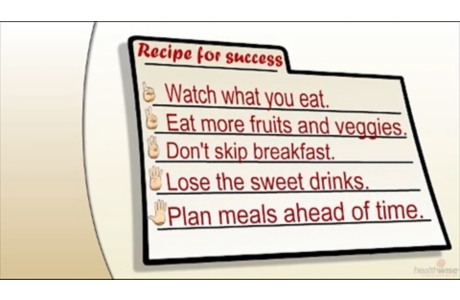Helping Your Child Who Is Overweight
How to know if your child is overweight
“Overweight” and “at risk of overweight” are terms sometimes used when referring to children who weigh more than expected. Doctors use the U.S. Centers for Disease Control and Prevention growth charts or the body mass index (BMI) to measure a child’s weight in relation to his or her height. To find out your child’s BMI, use this Interactive Tool: Is Your Child at a Healthy Weight?
If you have concerns that your child is overweight or at risk of becoming so, first ask your doctor to review your child’s growth charts and medical history with you.
- If your child’s BMI has been high on the growth chart from birth, this may be his or her healthy size and growth rate. He or she may simply be bigger than other children of the same gender and age.
- If your child’s BMI pattern has suddenly jumped from a lower range to a higher range on the growth chart, your child may be at risk of becoming overweight. Your doctor will carefully track growth over time, watching for a change in therate of weight gain.
- If your family has a history of obesity, your child has a higher risk of becoming overweight.
Sometimes a child’s BMI and weight can increase without a child being at risk of having too much body fat. For instance, before and during puberty it is normal for children to have a significant gain in weight before they begin to grow in height. Also, children who are very muscular (such as children who are very active in sports), may have a high BMI but have normal or even lower-than-normal amounts of body fat.
If your child’s BMI and growth pattern suggest a weight problem, your doctor will give your child an exam that looks for health problems that can cause weight gain. This may include questions about eating and physical activity habits. Regular checkups for health problems will also be important over time.
Health Tools
Health Tools help you make wise health decisions or take action to improve your health.
Weight management goals for your child who is overweight
Your job is to offer nutritious food choices at meals and snack times. You decide what, where, and when your family eats. Your child’s job is to choose how much he or she will eat of the foods you serve. Your child even gets to decide whether to eat.
Do not restrict food. Food restriction causes children to ignore their internal hunger gauges. Children who have their food restricted often end up heavier, because they become anxious about food and eating. Anxiety about not getting enough to eat will often lead a child to overeat whenever he or she gets a chance. This causes the child to become less in touch with how hungry or full he or she is, and the child becomes more likely to eat more than his or her body needs. This can also happen when children or teens follow weight-loss diets. It doesn’t work to put a child on a diet—you get the opposite effect.
Pay attention to behaviors that may be adding to weight gain, and then work to correct them. Then trust that your child will end up at the weight that is right for him or her.
If you are concerned about your child’s weight, talk to your child’s doctor. He or she can tell you if your child is gaining weight too quickly and can give you steps to take to help your child have a healthy weight.
How you can help your child
As a parent, your job is to give your child the tools for a healthy lifestyle and remain as relaxed as possible about the result.
To help your child eat well, use the same healthy eating approach with everyone in your family:
- Eat together as a family as much as possible. The entire family, regardless of each family member’s weight, should be offered the same food choices at meals.
- Choose water instead of sugary drinks, such as sport drinks, soft drinks, fruit juices, and fruit-flavored drinks. For some kids, cutting back on sugary drinks makes a big difference in balancing the calories that they take in and burn off.
- Remember that all foods, even less nutritious foods in small amounts, can fit into a healthy diet. Do not make any food item completely off limits. This may increase the desire for the forbidden food and can lead children to overeat when they get the chance.
- Avoid power struggles over food. Your job is to provide healthy choices at specific snack and mealtimes. It’s your child’s job to choose to eat or not eat.
- Have a regular meal and snack routine instead of snacking throughout the day. Schedule snacks for when your child is most hungry, such as after school or exercise.
- Offer nutritious food choices.
- Keep foods moderate in calories to help your child avoid getting too many calories. But don’t make meals so low-calorie that your child can’t feel full.
- Avoid using food as a reward, whether for an achievement or for “eating all your green beans.” (The “nutritious food, then dessert” tactic makes the healthier food seem like a less desirable food.)
- Serve dessert as part of the meal to avoid the “dessert struggle.” Offer healthier desserts, such as yogurt and fruit, more often than rich desserts. When you serve a rich dessert, it’s okay to set out a single portion for each person.
To help your child develop a balance between the calories he or she takes in and burns off:
- Shift the focus away from pounds and toward a healthy lifestyle by avoiding weighing your child every day. Think about not even using the bathroom scale.
- Move more. Make fun physical activity a part of your family’s daily life.
- Keep total TV and computer “screen time” to 2 or fewer hours a day.footnote 1 Encourage outdoor play as often as possible. Children should have at least 1 hour of moderate to vigorous activity each day.
As for any child with health concerns, make sure your child has all of the well-child checkups and treatment that your doctor recommends.
Helping your child with social and emotional concerns
It doesn’t take long for children to figure out that our culture and their peers idealize thinness. Children who are overweight are especially at risk of being teased and feeling alone. This can cause low self-esteem and depression.
For information about helping a child who is being teased, see the topic Bullying.
To help your child have greater health, confidence, and self-esteem, you can:
- Avoid talking in terms of your child’s weight. How you talk about your child’s body has a big impact on your child’s self-image. Instead, talk in terms of your child’s health, activity level, and other healthy lifestyle choices.
- Be a good role model by having a healthy attitude about food and activity. Even if you struggle with how you feel about your own body, avoid talk in front of your child about “being fat” and “needing to diet.” Instead, talk about and make the same healthy lifestyle choices you’d like for your child.
- Encourage activities, such as sports and theater. Physical activity helps build physical and emotional confidence. Try different types of sports and activities until your child finds one that he or she likes. Theater can help a child project strength and confidence, even if he or she doesn’t feel it at first.
- Encourage social involvement in community, church, and school activities, which build social skills and confidence.
- Help your child eat well by providing healthy food choices. Consider seeing a registered dietitian for guidance and new food ideas.
- Forbid any child (yours included) to tease another child about weight. Talk to your child’s teachers and/or counselors, if necessary.
Current as of: March 28, 2019
Author: Healthwise Staff
Medical Review:John Pope, MD, MPH – Pediatrics & Kathleen Romito, MD – Family Medicine & Martin J. Gabica, MD – Family Medicine & Rhonda O’Brien, MS, RD, CDE – Certified Diabetes Educator
This information does not replace the advice of a doctor. Healthwise, Incorporated, disclaims any warranty or liability for your use of this information. Your use of this information means that you agree to the Terms of Use. Learn how we develop our content.




